You might think that it’s beautiful to have entire families of rabbits hopping around your yard. In reality, though, rabbits are more pest-like than anything else, and they tend to eat any young plant that takes their fancy, destroying your garden and hard work in the process. Therefore, it stands to reason that you should prioritize keeping rabbits out of the garden.
How to Identify Rabbit Damage in Your Garden?
The best way to identify rabbits in your garden is by their damage. Rabbits eat almost any plant, including vegetables, flowers, and trees, and they can cause significant damage to gardens and crops. To find out if rabbits are responsible for the damage in your garden, look for the following signs:
– Chewed plants: Rabbits use sharp incisors to bite off plants at the base. This leaves a clean, 45-degree cut.
– Tracks: Rabbits have large hind feet and leave behind distinct tracks in soft soil or mud. Look for tracks that are about 2 inches wide.
– Droppings: Rabbit droppings are small, round pellets about 1/4 inch in diameter. You may find them in groups of 2-5 pellets.
Rabbits are likely responsible if you see any of these signs in your garden. To confirm that rabbits are the culprits, you can set up a trail camera to observe their activities. Once you have identified rabbits as the cause of the damage, you can take steps to get rid of them.
How to Prevent Rabbits?
The good news is that there are quite a few remedies for your problem. As such, you can give them all a try and determine which one works best for you. So, without further ado, here are some suggestions:
Build a Fence
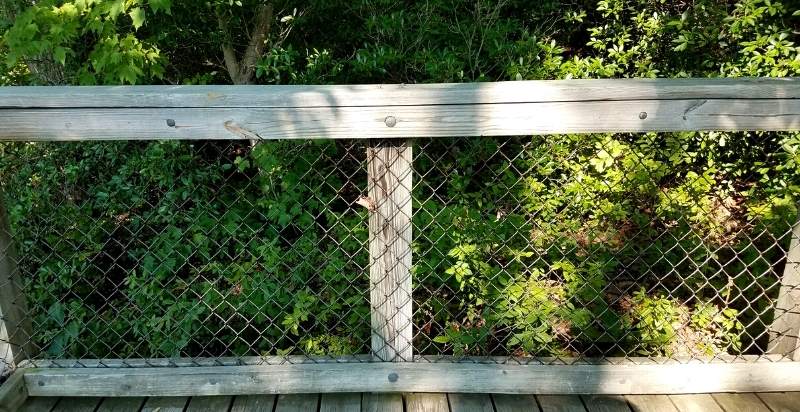
Of course, putting up a fence seems like a good idea, but most gardeners are actually hesitant to put one up. For one thing, makeshift fences can be a tad bit unsightly. For another, they make accessing your garden a little trickier. Still, if you want a foolproof way to keep the bunnies away, a fence is it.
Setting up a fence is a fairly simple process. All you really need are T-posts and enough wire mesh. You will find that fences around 3 feet tall will work to keep most rabbits out. If you live in an area with heavy snowfall, though, you may want to make it a bit taller, just to be on the safe side.
When selecting the mesh, make sure that each gap is less than one inch wide to prevent baby rabbits from slipping through. Then, when putting up the fence, make sure that the fence is buried at least six to ten inches in the ground. This way, the bunnies will be unable to dig under it.
Add Individual Barriers around Young Plants
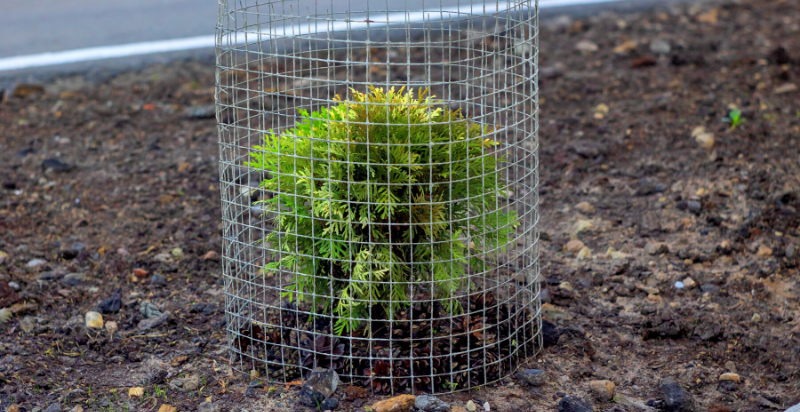
If you are looking for a more temporary alternative to a fence, consider setting up smaller mesh barriers around individual plants. As you can imagine, this works best for young trees, vines, and shrubs. You can continue to do this until the plants have become sturdier and will no longer appeal to the bunnies.
Once again, mesh works well for these barriers. Just remember to bury them deep enough in the ground so that the rabbits won’t be able to get to the roots. The barrier should be far enough from the trunk so that the rabbits can’t push through it to get a nibble.
Grow Rabbit-Resistant Plants Around Your Garden
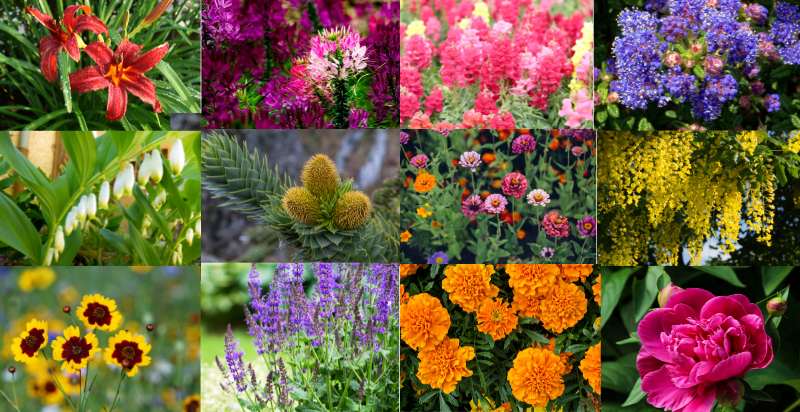
Now, there’s a good chance that you may not want to place fences around your garden or plants. Fortunately, there is something a lot more appealing that you can do instead. See, there are actually a number of plants that can be considered “rabbit resistant”.
These include yarrow, bee balm, lungwort, and lupine. As for shrubs, most bunnies will not dare nibble on holly, Oregon grape, juniper, lavender, and rosemary. You will find that they also stay away from fir, Japanese maple, and oak trees, even when they are young.
If you grow these plants and trees on the border of your garden, they will act as natural deterrents. Since the bunnies will not want to munch on these plants, it is unlikely that they will venture into your garden.
| Vegetables | Herbs and Spices | Flowers | Trees and Shrubs |
|---|---|---|---|
| Artichokes | Basil | Achillea | Azalea |
| Asparagus | Catmint | Artemisia | Blue Mist Spirea |
| Corn | Ginger | Bee balm | Black walnut |
| Cucumbers | Lavender | Begonia | Butterfly Bush |
| Garlic | Mint | Geranium | Fir |
| Onions | Oregano | Globe Thistle | Juniper |
| Peppers | Rosemary | Marigold | Spirea |
| Potatoes | Sage | Milkweed | Spruce |
| Squash | Sweet Alyssum | Salvia | |
| Tomatoes | Thyme | Sedum |
Remove Potential Hiding Places For Rabbits
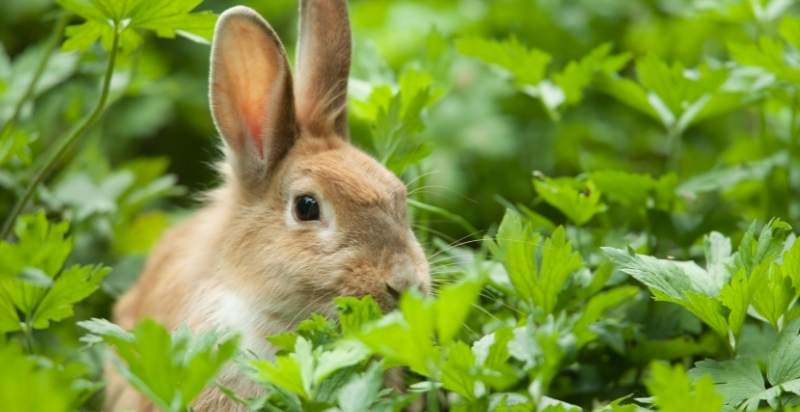
You should know that rabbits are prey to a large number of animals. Due to this, they will often look for areas where they can hide and take cover quickly. So, if your garden – or the area surrounding it – is covered with brush and debris, it is time to clean up. The same goes for overgrown grass.
If you clear out these areas, the bunnies will be reluctant to head out into such a wide open space, particularly at night. Even better, they will not want to nest in nearby areas, cutting down on the risk of you having to deal with overpopulation as well.
Natural Repellents

If you talk to a gardener about rabbit repellents, they will be sure to bring up some of their own natural solutions. The good thing about organic or natural repellents is that they are safe to use. Therefore, you don’t have to worry about your plants, pets, or family members being affected by these strategies.
The downside, though, is that many of these repellents don’t actually work. Or, they aren’t consistent in keeping the rabbits away. One of the more popular repellants involves spreading blood meal in the soil. Some gardeners have also been known to sprinkle black pepper, cayenne pepper, and even Tabasco around the garden.
While you can certainly give these a try, it is unlikely that they will help. Not to mention, they will be easily washed away with the first shower of rain. So, they need to be reapplied constantly.
Tactics to Avoid
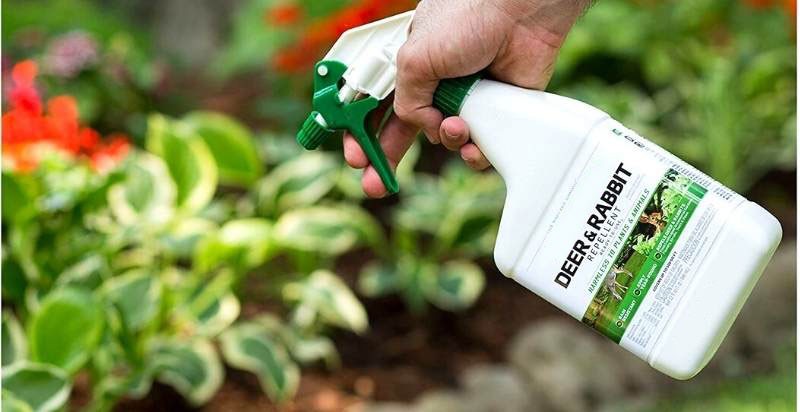
As you can imagine, there are several measures you can implement when it comes to keeping rabbits away. Nevertheless, not all these strategies are encouraged. In addition to not being effective, some of these tactics may be downright dangerous. Here is what you should avoid:
Chemical Repellents
There are quite a few of these products available in the market. However, if you are planning to grow vegetables or edible plants, you need to avoid using such substances. They can easily seep into the soil and the roots and leaves of the plants. So, when you eat these plants, the toxins will enter your body.
Scare Tactics
It is a common belief that rabbits are afraid of scarecrows and machines that emit sound or light. Unfortunately, this isn’t true. Even though rabbits are initially scared off by such tactics, they will end up getting used to them. Once this happens, they won’t be too hesitant to hop into your garden and nibble at your plants.
Live Trapping
There are certainly more humane ways to trap rabbits. Still, it is essential to remember that rabbits might be terrified when trapped in such conditions, leading to trauma. Even if you do capture a healthy rabbit, you are left with another problem on your hands. What are you supposed to do with the bunny? Unless you have a suitable place to dump them in, you will simply have to release the rabbit.
You should (and shouldn’t) do these things to keep rabbits away from your plants. You can try just one of these solutions or consider combining them for added effect. Either way, you will find that it is much easier to keep your garden a rabbit-free zone.
- Everything You Wanted to Know About Red Tamarillos - June 2, 2025
- A Guide to Tulips: Everything You Need to Know & More… - June 2, 2025
- Guanabana: Description, Flavor, Benefits, And Uses - May 27, 2025
